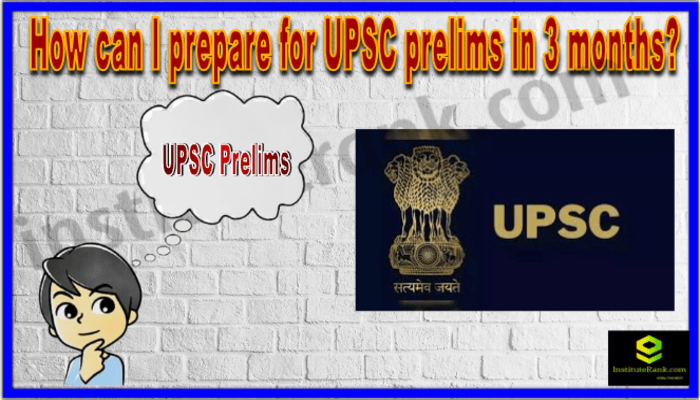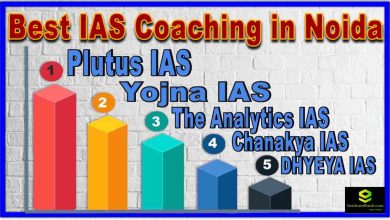How can I prepare for UPSC prelims in 3 months?

Preparing for the UPSC Prelims in just three months is not that easy, but there’s always a way with the strategy to ensure that one maximizes their chances of success. The UPSC Prelims comprise General Studies (GS) and Civil Services Aptitude Test (CSAT). GS is the real deciding factor for qualification while CSAT is qualifying. Here comes the need for a well-structured plan, focused study, and disciplined execution. To begin with, the syllabus and pattern of examination should be understood well. General Studies refers to history, geography, polity, economy, environment, science and technology, and current affairs. CSAT generally consists of logical reasoning ability, analytical ability, and comprehension. As time is less, prioritization of topics will be of utmost importance according to the weightage and relevance assigned. Thus, the strategy for the three months will be divided into three parts: the first month will include complete coverage, the second will offer revision and test practices, and the last will be intensive revision and mock tests.
UPSC Prelims: The Basic Understanding
Pattern of Examination
General Studies Paper-I (200 Marks): Contains 100 objective multiple-choice questions.
Sub-topics generally include:
- History (Ancient, Medieval, Modern)
- Geography (India & World)
- Polity & Governance
- Economy
- Environment & Ecology
- Science & Technology
- Current Affairs
CSAT (Paper-II) (200 Marks): Contains 80 objective multiple-choice questions.
It covers:
- Comprehension
- Logical reasoning & analytical ability
- Basic numeracy & data interpretation
- Decision making & problem-solving
- Notes: CSAT is a qualifying paper; 33% is required to pass.
The Strategy for Preparation for Three Months
Month 1: Foundation Laying
Week 1: Understanding the Syllabus & Resources
- Thoroughly go through the syllabus.
- Refer to past papers to understand the trend in the examination questions.
- Arrange standard study materials such as:
- NCERTs (6th-12th for History, Geography, Polity, Economy, Science)
- Standard books (Laxmikanth for Polity, Spectrum for Modern History, Ramesh Singh for Economy, etc.)
- Monthly magazines (Yojana, Kurukshetra, Economic Survey, PIB updates)
- Make daily schedules of study (8-10 hours).
Week 2 & 3: Core Subject Preparation
- Polity: Read Laxmikanth, make notes, and solve previous years’ questions.
- Modern History: Cover Spectrum’s Modern History.
- Geography: Study NCERTs and G.C. Leong’s book.
- Economy: Complete Ramesh Singh’s Indian Economy.
- Environment: Read Shankar’s IAS book on the Environment.
- Current Affairs: Read newspapers (The Hindu/Indian Express) and online current affairs compilations.
- CSAT: Daily practice comprehension, reasoning, and basic numeracy.
Week 4: Revision & Practice Tests
- Revise notes of core subjects.
- Take sectional tests on Polity, History, and Geography.
- Analyze mistakes and improve weak areas.
- Practice CSAT questions for at least 1-2 hours daily.
Month 2: Strengthening Knowledge & Practicing MCQs
Week 5 & 6: Cover Remaining Subjects
- Ancient & Medieval History: Read Tamil Nadu History Book + NCERT Book.
- Science & Technology: Emphasis should be on current affairs on science from newspapers and compilations.
- Indian Economy (Budget & Economic Survey Highlights): An emphasis should be on topics such as inflation, fiscal policy, banking sector, etc.
- Environment & Ecology: Important acts, biodiversity hotspots, and climate change issues need to be learned.
- Current Affairs: Monthly compilations from credible sources should be revised.
Week 7: Concentrate on Test Series & Mastering CSAT.
- Join a test series and try to attempt at least 2 full-length tests.
- Work on time management by solving GS papers in 2 hours.
- Practice CSAT for numerical ability and logical reasoning.
- Distinguish weak areas in the tests and revise them.
The third month of my preparation revolves around full-length tests and intensive revision.
Weeks 8 and 9 are entirely dedicated to revision.
- Revise all NCERTs and all other standard reference books.
- Concentrate on important facts and data while maintaining clarity on concepts.
- Daily solving of MCQs continues (100-150 questions a day).
- Current Affairs should be reinforced (events in the past year, government schemes, major policies).
Week 10: This week is reserved for the first half of the tests and exam simulation.
- Take full-length mock tests every two days under exam-like conditions.
- Revision of notes and correction of past mistakes.
- Trying to guess appropriately (Elimination method, or Intelligent Guessing).
- Revision of Maps, Important Dates, and Formulas without stopping.
The last week: Smart Revision and Mental Preparation
- Do not touch upon any new topics; only focus on revision.
- Revise all important schemes, Acts, Supreme Court judgments, and various reports.
- 2-3 full mock tests must be taken and analyzed.
- Make sure to catch up on sleep and avoid any stress before D-day.
Conclusion
Preparing for the UPSC Prelims in three months strongly emphasizes dedication, consistency, and strategic planning. Focused studies, rigorous revision, and practice maximize the possibility of clearing the exam. The spirit is to stay confident, stay motivated, and work faithfully towards executing the plan. An exam-oriented approach and discipline should assist in comprehending the entire syllabus and bolstering performance on the examination day. With a structured plan and perseverance, one can prepare for the UPSC Prelims during the stipulated time frame.
A three-month timeframe to crack the UPSC Prelims is taxing but possible by smart work, discipline, and consistency. Keep your focus on the high-yield topics and practice a lot while revising selectively. Maintain your confidence; trust your preparation; and put in your best on Examination Day!
All the best for your UPSC journey!
Related article
Best IAS Coaching In Mukherjee Nagar 2024



